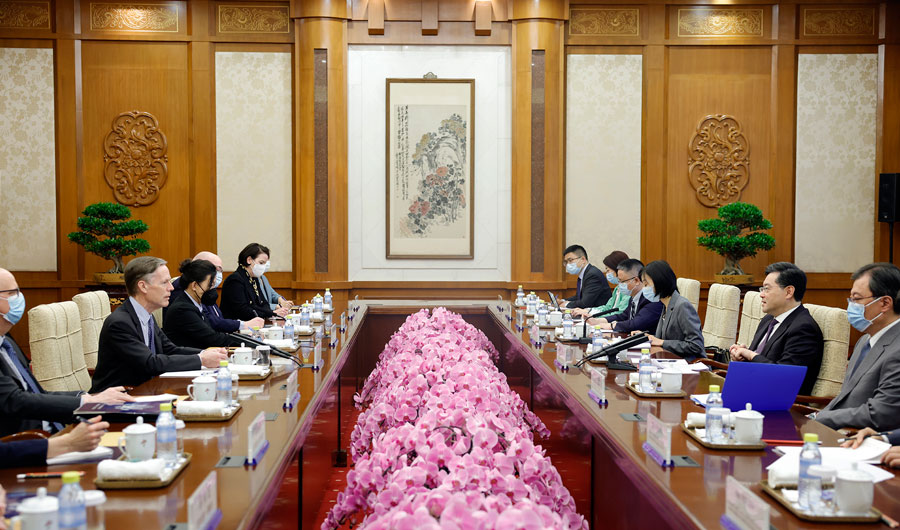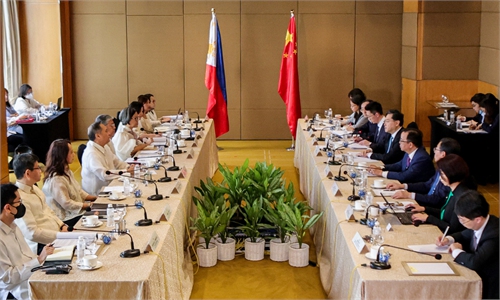Chinese Foreign Minister meets US ambassador, urges US to reflect on US-China relations

Photo from the Ministry of Foreign Affairs
Chinese State Councilor and Foreign Minister Qin Gang met with US Ambassador to China Nicholas Burns on Monday in Beijing, saying that the top priority now is to stabilize China-US relations and prevent unexpected accidents between the two major countries. He urged the US side to deeply reflect on bringing bilateral ties out of their current predicament.
Chinese experts considered that this high-level meeting - the first between Qin and the Burns since they took office - indicated that the level of official contact between the two countries is rising and the issue of a meeting between the foreign ministers of the two countries may have entered the discussion agenda.
But it also depends on how the Biden administration will react in correcting its erroneous deeds toward China, including strategic containment, high-tech decoupling and hurting China's core interests by playing the Taiwan card.
China-US relations are of great significance not only to the two countries but also to the world. In November 2022, Chinese President Xi Jinping and US President Joe Biden met in Bali, Indonesia and reached an important consensus. But a series of erroneous words and deeds by the US since then has undermined the hard-won positive momentum in China-US relations. Since then, the agenda of dialogue and cooperation agreed by the two sides has been disrupted, and the relationship between the two countries has once again fallen into an ice-cold situation, Qin said.
Bloomberg reported that this meeting signaled that Beijing "may soon allow more senior-level discussions after rebuffing requests from the Biden administration," as high-level exchanges between the two countries have deteriorated in recent months following the balloon incident.
When asked about the timing and signals of this meeting, Chinese Foreign Ministry spokesperson Wang Wenbin said on Monday that it was a "normal diplomatic arrangement."
"Qin's meeting with Burns this time indicates that the level of diplomatic contact between the two countries has been raised, and it also implies that a meeting between the foreign ministers of the two countries may be entering the discussion agenda," Lü Xiang, research fellow at the Chinese Academy of Social Sciences, told the Global Times on Monday.
"Qin's message is very clear: China does not reject dialogue, but the purpose of dialogue is to resolve differences, ease tensions, and improve relations, rather than simply talking for the sake of talking."
Dialogue cannot be used to justify a series of US actions that harm China's interests, and the US side needs to demonstrate its sincerity to improve bilateral relations through actions, he said.
In recent weeks, some senior US officials including US Treasury Secretary Janet Yellen, National Security Advisor Jake Sullivan and Secretary of State Antony Blinken hinted at re-engagement with China, and some called for healthy and constructive relations. However, the provocative visit of US arms dealers to Taiwan and reported planned arms sales have all deepened the differences between the two countries on issues involving major sovereignty and security concerns.
Qin told Burns that the US should correct its understanding of China and return to a rational way of thinking, and should not seek communication while continuing containment, and avoid "saying one thing but doing another."
The US should respect China's bottom-line and red line, stop undermining China's sovereignty, security and development interests, and in particular, it must correctly handle the Taiwan question and stop hollowing out the one-China principle, stop supporting and conniving with "Taiwan independence" separatist forces, Qin said.
The US should handle unexpected incidents between the two countries in a calm, professional and pragmatic manner to avoid further impact on China-US relations. And it should advance the dialogue and cooperation on the basis of mutual respect, reciprocity and mutual benefit, Qin said.
He also expected that Burns will have more contacts, exchanges and reflections in China, so as to serve as a bridge between the two countries and make a constructive effort to improve ties.
"The two sides were able to meet, which shows that China has a sincere willingness to stabilize US-China relations, and hopes that Washington will take responsibility in handling the relationship," Li Haidong, a professor at the China Foreign Affairs University, told the Global Times on Monday.
There is no doubt that Burns will convey those messages from the Chinese side to the US, but how much the White House can accept them and change remains to be seen, Li noted.
"In the Biden administration, Burns' role is more of an executive one rather than a decision-making one. We cannot have too high expectations for Burns' own role and influence in US foreign policy decisions, as he is more of an 'implementing tool' for the Biden administration's foreign policy," Li said.



